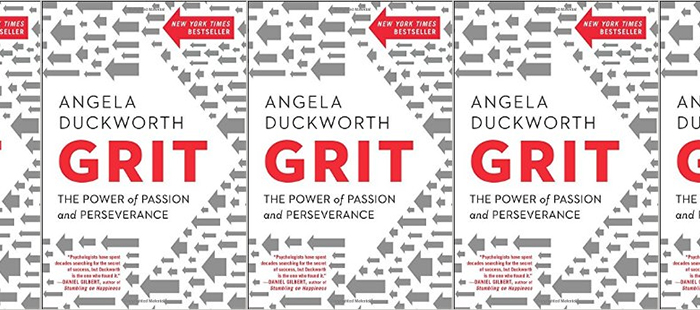Review: GRIT: THE POWER OF PASSION AND PERSEVERANCE by Angela Duckworth

Grit: The Power of Passion and Perseverance
Angela Duckworth
Scribner, May 2016
354 pp, $28
Buy: hardcover | eBook
Reviewed by Aaron Sommers
There’s a new teacher’s pet in class.
It’s not the newest, most scientific standardized test to measure student achievement. It has nothing to do with the allure of technology in classrooms, either.
Standing front and center on the national education agenda is the power of “grit.”
What’s grit? Perhaps the person best qualified to answer this is Angela Duckworth, a psychologist at the University of Pennsylvania and author of Grit: The Power of Passion and Perseverance.
Duckworth has dedicated her career examining the difference between those who are successful in a given field and those that aren’t. It’s a multifaceted mission, noble in its intent but weak on fresh insight.
She first tries to distinguish grit from a similar attribute like conscientiousness by using a factor called “consistency of effort.” In other words, gritty people tend to have a singular passion they pursue year-in and year-out, accumulating, she estimates, “10,000 hours” of deliberate practice toward a point of utter mastery.
Components of conscientiousness include organization, self-control, thoughtfulness and goal-directed behavior. Grit is basically conscientiousness on steroids.
In various studies, conscientiousness scores and grit scores are very highly correlated, between 80 and 98 percent. Therefore, Duckworth acknowledges that some consider grit a case of “old wine in new bottles,” but cannot give us reasons this is inaccurate. The title of her book sets the tone. Who would doubt the worth of perseverance and passion? They’ve been extolled by everyone’s grandparent at least once in their lives.
Nonetheless, the fact remains that the qualities that make up grittiness in athletes, academics, and artists are universally accepted as valuable ingredients towards success in any field you look at.
But it turns out they’re rare, too. Because perseverance is more than a high IQ or great SAT scores. Grit has less to do with the rewarding end and more to do with the daunting means. All of this leaves me wondering how a concept like grit can—or should be—quantified.
Duckworth manages to configure a scale to measure grit. She notes her data found high scores in grit correlated with future educational attainment and success in national spelling bee championships. Nothing particularly earth shattering there. But the important point she seems to make is that the process is as important as the product. Grit is formed through years of consistent hard work and—most importantly—failure.
In her dissection of a pop psychology phenom, Duckworth presents some old news in an engaging, authoritative text that at times borders the dogmatic (could this, too, be the result of grit?).
I was left wondering how teachers in underfunded districts can put her ideas to practice. Since Duckworth offers us little in terms of practical applications, we’re all left with a familiar concept reinforcing what we’ve heard before, though we’re not throwing in the towel anytime soon.
Aaron Sommers is a writer living in New Hampshire. His fiction has appeared in The Berkeley Fiction Review and The Olive Tree Review, among others. There’s more about him at www.aaronsommers.com. He can be followed @aaronsommers.


